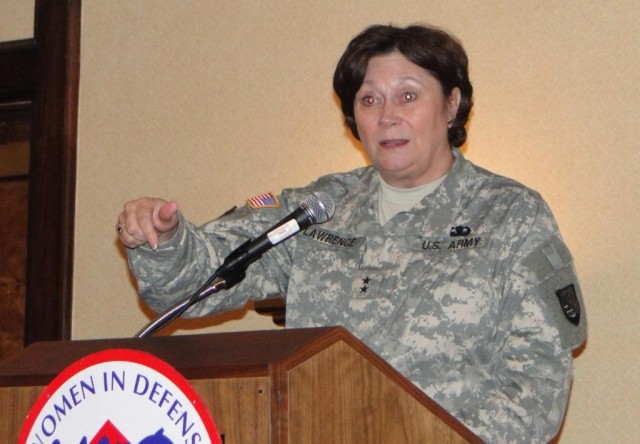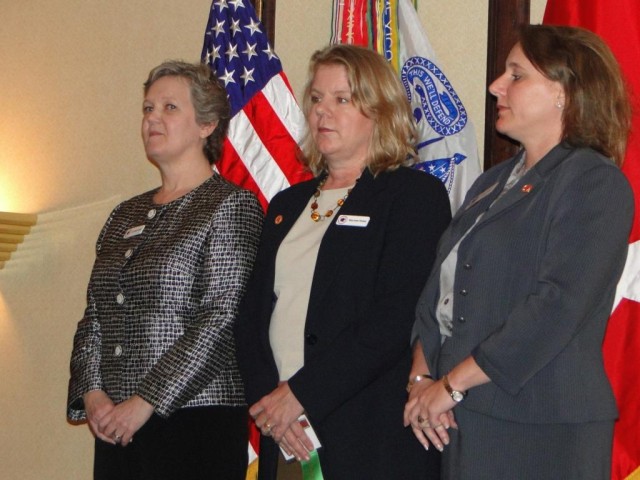Huntsville's leadership in the promotion of women in defense-related careers is a perfect fit for a city that is known for its "forward thinking," said a top Army official.
"Since 1979, Women in Defense has provided members with forums for professional growth. Today there are 15 chapters for women who work in a primarily male industry and environment," said Brig. Gen. Susan Lawrence, commander of the Army's Network Enterprise Technology Command/9th Signal Command.
"Women in Defense has been adding chapters fast and furious in the last five to 10 years. A Huntsville chapter is only natural for the Huntsville area because it is one of the most forward thinking areas for its time."
The Tennessee Valley Chapter of Women in Defense was started in March 2003.
Speaking to an audience of about 250 members of the local WID chapter and the National Defense Industrial Association, Lawrence outlined Huntsville's history in the promotion of women in defense-related careers, beginning in the 1940s when women worked in the Army's local chemical and ammunition plants to replace the men who went to fight in World War II.
"Their work helped their families financially and their performance was very much related to their own patriotic duty," Lawrence said. "Many of our predecessors recognized the challenges they faced and they all took on those challenges to make our nation a stronger place to live, to serve and to work."
Lawrence said there is "no institution more supportive of women then the Department of Defense. It's been two decades since the Department of Defense first allowed women to go to service academies. Now we have 57 women generals or admirals. Five three-star female generals and, the great news last November, is we now have one female four-star. I've served with her and there is no better selection than General Ann Dunwoody."
Lawrence's keynote address at the WID luncheon opened the chapter's half-day workshop on "Preparing to Support Challenges in National Security" on Oct. 14 at the Huntsville Marriott.
In the 21st century, the challenges and tests are "very real" as the nation continues its now eight-year wars in both Iraq and Afghanistan, Lawrence said. Those challenges include providing the Army with an information technology communications network that is efficient, reliable, safe and secure.
"Our equipment, training, and evolving policies and procedures must guarantee that the forces in the field will have what they need," she said. "We are rooted in the industrial age. We must bring our policies and requirements of information technology into the information age.
"We are extremely network dependent. We can fight on no battlefield without our dependence on that network, and the information we receive and trust."
The Army will be going to a global network enterprise in the near future, she said.
"Right now we have in excess of 15 different networks. They can't share information. They can't find people," Lawrence said. "We are looking for efficiencies. We are talking to industry partners who have been forced to go to networks so we can learn from their lessons. How do we deliver this global network enterprise'"
In the future Army - which will be 80 percent U.S.-based - the enterprise network must be quickly accessible for units that deploy with little or no notice.
The number one hurdle to achieving the global network enterprise, Lawrence said, is the culture and an understanding of why change is needed.
"Breaking down the barrier of how we do business today is huge," she said, as the Army looks for ways to reduce its number of entry points into the network from 440 to five or six.
"Getting through to commands and earning their understanding and trust is important as we go forward on this."
One command headquarters that has stepped up as a "first responder" in the Army's global network enterprise is the Army Materiel Command under Dunwoody's command.
"With an enterprise system, General Dunwoody can unplug her computer, move to Redstone Arsenal and plug in here" without any delays, Lawrence said.
"AMC is a great partner that's stood up and said 'We are going to make this happen.'"
The global enterprise network will help the Army combat the more than 1,000 cyber attacks it gets every day.
"If they could shut down Wall Street for a day they would change the way we live. If they could shut down the power grid in the Northeast for a week they would change the way we live," Lawrence said.
"The threat is here and it's real and the enemy is inside our wire today as they continue to prod and take information from us. A global enterprise network would gain efficiencies and greatly improve the defense of our network and information. It's no longer land, air and sea. It's now cyber land, air and sea ... We will build this enterprise, enforce our efficiencies and improve."
Lawrence said discussions are ongoing as to whether a separate command for cyber space is needed in the Army. But, regardless how those discussions go, Lawrence said, the American spirit will continue to prevail and be the envy of the world.
"It is all of us together united that will meet our nation's security challenges in the 21st century," she said. "We are fighting on a new domain and our people are the key defenders of our nation ... We're blessed. But we're nervous enough to know there are a lot of people out there who want to penetrate and hurt us."
Also at the luncheon, Pamela McCue, director of the Missile and Space Intelligence Center, was recognized with the WID chapter's Leadership Award-Government, presented to women who demonstrate a distinguished level of excellence and accomplishment in support of national defense in an industry or government role. Irma Tuder, principal of Tuder Investments and founder of Analytical Service, was presented with the Leadership Award-Industry.
The chapter's new officers were also sworn in. They include: Cristina Hinkle, president; Mary Anna Thomas, vice president; Kym Watkin-Statham, secretary; Elizabeth Graham, treasurer; Jeanne Weaver, communications director; Patty Popour (assistant Kathy Broad), programs; Sandra Pape, membership/education director; Stephanie Sellers, awards/scholarship director; Corby Dellarocco, external relations director; Carol Tevepaugh, membership director; Debbie Fraley, Nancy Small and Melanie Baker, directors at-large; and Gina Best, past president.
The workshop included presentations by Teresa Gerton, acting executive deputy to the AMC commanding general, on AMC: Preparing to Support Challenges; by McCue on Defining the Threat for National Security; and by Brig. Gen. Heidi Brown, deputy commanding general for sustainment, Multi-National Corps, Iraq, on Challenges from Iraq. Panel discussions included Technology Challenges, Acquisition and Contracting Challenges, and Foreign Military Sales in National Security.




Social Sharing